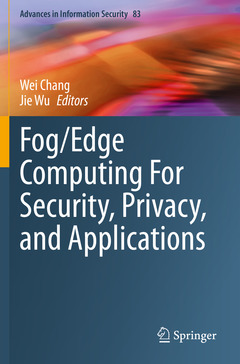Fog/Edge Computing For Security, Privacy, and Applications, 1st ed. 2021 Advances in Information Security Series, Vol. 83
Coordonnateurs : Chang Wei, Wu Jie

Part I: Overview of Fog/Edge Computing
1. "Confluence of 4G LTE, 5G, fog, and cloud computing and understanding security issues"
Khaldoon Alshouiliy (University of Cincinnati, USA)Dharma Agrawal (University of Cincinnati, USA)
2. “An overview of the Edge Computing in Modern Digital Age”
Reinaldo Padilha França (University of Campinas- UNICAMP, Brazil)
Ana Carolina Borges Monteiro (University of Campinas- UNICAMP, Brazil)
Rangel Arthur (University of Campinas- UNICAMP, Brazil)Yuzo Lano (University of Campinas- UNICAMP, Brazil)
Part II: Security in Fog/Edge Computing
3. "Secure Search and Storage Services in Fog/Edge Computing"
Qin Liu (Hunan University, China)
4. “Collaborative Intrusion Detection Schemes in Fog-to-Things Computing”
Abebe Diro (La Trobe University, Australia)
Abdun Mahmood (La Trobe University, Australia)
Naveen Chilamkurti (La Trobe University, Australia)
5. “On the Feasibility of Byzantine Agreement to Secure Fog/Edge Data Management”
Ali Shoker (VORTEX Colab, Portugal)
Hussam Yactine (INESC TEC and Universidade do Minho, Portugal)
Part III: Privacy in Fog/Edge Computing
6. “Privacy Issues in Edge Computing”
Qi Xia (College of William and Mary, USA)
Zeyi Tao (College of William and Mary, USA)
Qun Li (College of William and Mary, USA)7. "Privacy-preserving Edge Video Analytics"
Miao Hu (Sun Yat-sen University, China)
Yao Fu (Sun Yat-sen University, China)Di Wu (Sun Yat-sen University, China)
Part IV: Architectural Design in Fog/Edge Computing
8. “Vulnerabilities in Fog/Edge Computing from Architectural Perspectives”
Nhu-Ngoc Dao (Sejong University, South Korea)
Ngoc-Thanh Dinh (Soongsil University, South Korea)
Quoc-Viet Pham (Pusan National University, South Korea)
Trung V. Phan (Technische Universität Chemnitz, Germany)
Sungrae Cho (Chung-Ang University, South Korea)Torsten Braun (University of Bern, Switzerland)
9. "Security and Intelligent Management for Fog/Edge Computing Resources"
Jun Wu (Shanghai Jiao Tong University, China)
10. “Algorithms for NFV-Enabled Multicasting in Mobile Edge Computing”
Zichuan Xu (Dalian University of Technology, China)
Weifa Liang (The Australian National University, Australia)
11. “Blockchain-based Security Services for Fog Computing”
Arvind Kiwelekar (Dr. Babasaheb Ambedkar Technological University, India)Pramod Patil (Dr. Babasaheb Ambedkar Technological University, India
Laxman D. Netak (Dr. Babasaheb Ambedkar Technological University, India)
Sanjay U Waikar (Dr. Babasaheb Ambedkar Technological University, India)
Part V: Applications of Fog/Edge Computing
12. “Industrial Internet of Things (IIoT) Applications of Edge and Fog Computing: A Review and Future Directions”
G. S. S. Chalapathi (BITS Pilani, Pilani Campus, India, and The University of Melbourne, Australia)
Vinay Chamola (BITS Pilani, Pilani Campus, India)
Aabhaas Vaish (BITS Pilani, Pilani Campus, India)
Rajkumar Buyya (The University of Melbourne, Australia)
13. “Security Problems in Edge Computing and Augmented Reality”
Sarah M. Lehman (Temple University, USA)
Chiu C. Tan (Temple University, USA)
14. “Towards a Security-aware Deployment of Data Streaming Applications in Fog Computing”
Gariele Russo Russo (University of Rome Tor Vergata, Italy)
Valeria Cardellini (University of Rome Tor Vergata, Italy)
Francesco Lo Presti (University of Rome Tor Vergata, Italy)Matteo Nardelli (University of Rome Tor Vergata, Italy)
15. “Blockchain of Finite-Lifetime Blocks for Edge-IoT Applications”
Shravan Garlapati (Qualcomm Technologies Inc.)
One of the first few books that emphasizes on new techniques for fog/edge computing and its applications, such as security, privacy and machine learning
Primarily focuses on security and privacy for fog/edge computing
Introduces cutting-edge research, such as NFV and blockchain
Includes many state-of-art real-life examples
Date de parution : 01-2022
Ouvrage de 418 p.
15.5x23.5 cm
Date de parution : 01-2021
Ouvrage de 418 p.
15.5x23.5 cm
Thèmes de Fog/Edge Computing For Security, Privacy, and Applications :
Mots-clés :
Security; Privacy; Trust; Fog Computing; Cloud Computing; Edge Computing; Mobile Computing; Storage; Communication; Big Data; Internet of Things; Software Defined Networks; Architecture; Applications; Blockchain; Vulnerability; Resource Management; Network Function Virtualization; Augmented Reality; Data Streaming
Ces ouvrages sont susceptibles de vous intéresser

Fog-Enabled Intelligent IoT Systems 105,49 €


